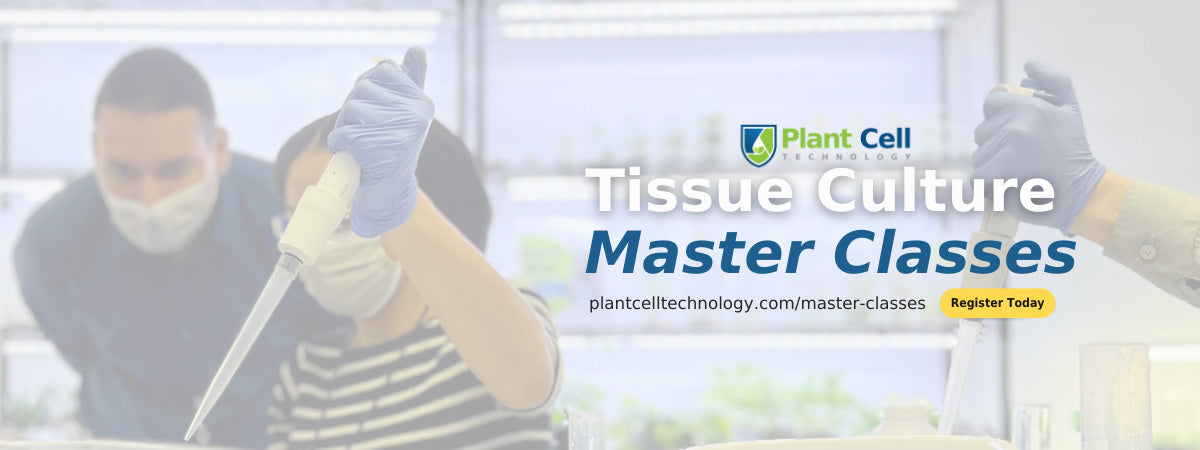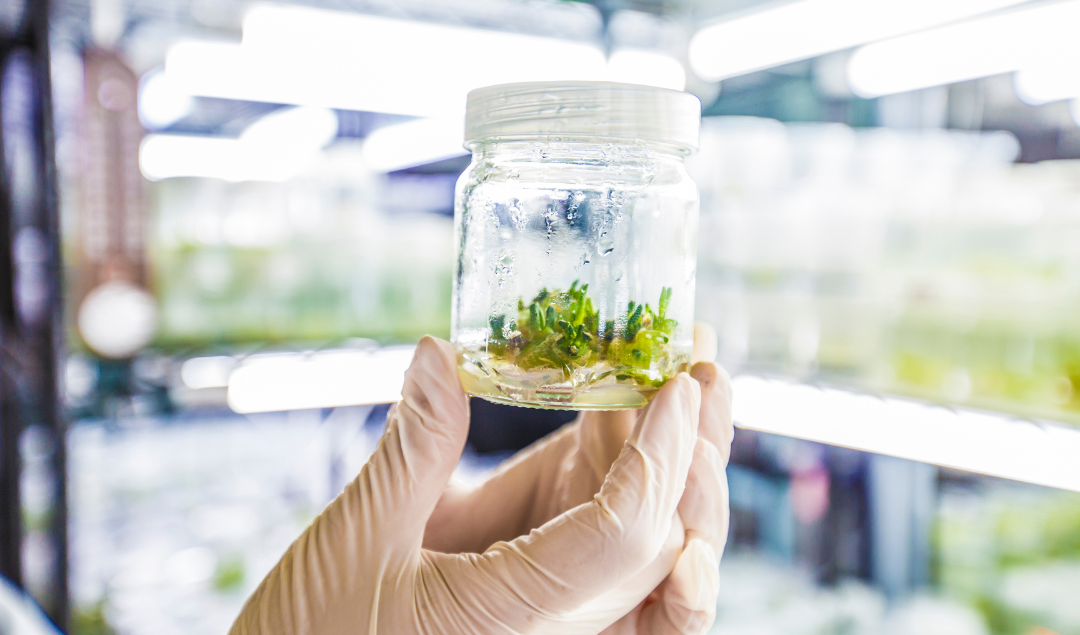
How Can The Biocoupler™ Help Your Plant Business Grow?
As a content and community manager, I leverage my expertise in plant biotechnology, passion for tissue culture, and writing skills to create compelling articles, simplifying intricate scientific concepts, and address your inquiries. As a dedicated science communicator, I strive to spark curiosity and foster a love for science in my audience.


Introduction
Have a plant business that you’re willing to grow?
Why don’t you try tissue culture?
Tissue culture is an advanced technique for growing plants. It only requires a few tissues of plants to be introduced in a suitable growth medium under controlled conditions. The technique has been around for decades, however, due to the limited accessibility and awareness about its applications, the technique has been constrained to research labs or giant plant-based industries.
But, now the knowledge of the technique is easily accessible and available. The world of technology and the internet has made it easier for people to teach and learn from any corner of the world.
Even we offer all pant tissue culturists, growers, and hobbyists a tissue culture master class on different plants, such as houseplants, carnivorous, and cannabis plants in Washington D.C.
If interested in learning about it more, check out this link!
Why so much buzz about tissue culture?
It’s mainly because of the advantages the technique offers and its applications in a range of plant industries and labs, such as:
- You can grow plants in shorter periods of time and irrespective of their favorable season.
- You need only a few tissues to grow plants, thus it makes it easy to multiply and protect endangered species.
- It allows the conservation of elite plant varieties.
- You can produce a massive number of plants in even a small space.
- It enables you to produce disease-free plants, haploid plants, or hybrid varieties.
And, there’s more!
The multiplication of plants in tissue culture is made easy by Plant Cell Technology’s proprietary product, Biocoupler™.
In this article, you will learn more about the Biocoupler™, including what it is, its advantages, usage, and how can you exploit the technique to grow your plant business and generate better revenue.
What is Biocoupler™ and How Does It Ease The Tissue Culture Process?

Biocoupler™ is one of the simplest temporary immersion bioreactors available today in the market. It’s a cap-like device that comes with an integrated filter and adjustable vent to help you carry out the temporary immersion of your tissue culture plants.
How exactly can you do that?
It can easily be done by attaching two mason jars on both sides of the cap. Then, on side of the jar add liquid nutrient media (without agar) and on the other keep your established tissue culture plants.
Then, whenever you need to immerse your plants in tissue culture, you can tilt the jar manually and through the vent, the media easily passes to the other side and supply nutrients to plants.
It makes the temporary immersion process completely effortless!
What Are The Advantages of Using a Biocoupler™?

The Biocoupler™ offers many advantages. Especially when you’re a small or individual lab searching for an affordable option for bioreactors, the Bicoupler™ is for you! Further, you might think of creating your own DIY Temporary Immersion Bioreactor, but, it’s not a good idea when you can easily get Biocuplers.
We aren’t bragging, just see how much value it adds to your lab:
- As opposed to a DIY TIB, which requires many complex components like pumps, gears, tubing, filters, timers, solenoids, and flow balancing valves, the BioCoupler™ only requires two standard mason jars.
- Unlike DIY TIB, no electricity is required for Biocouplers™. And, also they are easy to use and handle.
- Biocoupler™ only requires a small space on your shelf, however, a DIY TIB or any other can take 4X more space.
- As opposed to DIY TIBs, which have complicated parts that require more effort in their assemblage and maintenance, the Biocoupler™ has simple parts that can easily be replaced.
- Biocoupler™ is autoclavable, which prevent contamination in the cultures. This is unlike other bioreactors in which all parts cannot be sterilized.
- When compared to DIY TIBs, the Biocoupler™ is much cheaper and operates at its full capacity without compromising plant quality.
- DIY Temporary Immersion Bioreactors require labor-intensive assembly and disassembly whereas BioCouplers™ do not.
The Biocoupler™ has been successfully tested for a wide range of plants, including orchids, cannabis, aquatics, succulents, ferns, and carnivorous plants.
Steps of Operating Biocoupler™

Follow the given steps to best utilize the Biocoupler™ in your tissue culture application:
- Prepare liquid tissue culture media using PCT’s MS media and add sugar based on the quantity of media you’re making (generally for 1-liter media, 30 grams of sugar is added). (DO NOT add Agar).
- Take the Biocoupler™ and connect two Mason jars at their two ends.
- Measure 200 ml of prepared MS media.
- Open one side of the Biocoupler™ and add the measured 200 ml media to it.
- As you have prepared 1000 ml media, so can prepare a set of 5 Biocoupler™ with 200 ml MS media each.
- After filling the jars, close the Biocouplers™ loosely and autoclave them!
Open the Biocoupler™ under the laminar hood after autoclaving and transfer your plants into it. That’s it!
How You Can Use Biocoupler™ To Make As Much as $5K?

The sole purpose of the Biocoupler™ is the multiplication of established tissue culture plants. As you know, tissue culture allows you to grow hundreds and thousands of plants in small closed vessels. And, the Bioocupler™ allows your tissue culture-established plants to grow in space by supplying them with optimum nutrients and an environment to flourish well.
This kind of temporary immersion bioreactor system especially helps plants against physiological disorders, such as vitrification, and prevents hyperhydricity. Moreover, as the plants are not submerged in the liquid media all the time, they can breathe properly (gas exchange). Furthermore, there won’t be any mechanical stress as there’s no agitation involved—which is required in other temporary immersion bioreactor systems.
Our lab director Francisco has been using Biocoupler™ to multiply all of his houseplants and carnivorous plants, such as Philodendrons (pink princess), Monstera, and Nepenthes. In one Biocoupler™ Francisco gets around 50-100 plantlets in the span of two months, which he stores for future uses after rooting and acclimation.
Often when the plants are grown in massive numbers (generally hundreds), he tries to sell them to other vendors. So, to give you an example of how much he exactly makes by selling the plants here’s Francisco’s case.
For example, if Francisco sells Philodendrons Pink Princess (the small tissue culture grown platelet), he is able to sell it for $25 and a little bit grown plants for $50. So, if in one Biocoupler™, he has 100 plants, and he sells them, he is able to make $2500, and from the bigger plants, he makes $5000—all in the span of two months.
Watch this video and hear from Francisco himself about making dollars using the Biocoupler™!
Here’re some tips to sell your plants better:
- Research which plants are most demanded in your areas and are being sold at good prices.
- Network with nurseries close to you and make a good deal with them about selling healthy and disease-free plants based on their requirements.
- You can also reach out to industries working in the areas of secondary metabolite production using that plant or a global supplier of plants.
- You can sell both, tissue culture plants, as well as properly acclimated plants.
While doing so, your selling skill plays a huge role. Also, when you gain the trust of other businesses and vendors in the production of disease-free tissue culture plants, you can definitely get an edge over your competitors in your area. Social media platforms can be a huge help to advertise you and your brands.
NEED HELP WITH USING TISSUE CULTURE EQUIPMENT AND INTRODUCING PLANTS TO TISSUE CULTURE? PLANT CELL TECHNOLOGY IS YOUR PARTNER!

We’ve consultation services that allow you to directly talk with our in-house tissue culture expert. He will join you in a video call and will answer all and every question you will have regarding using the equipment or introducing your plants in tissue culture. It’s the best approach to getting instant solutions to your tissue culture problems.
We also curate weekly blogs and videos on tissue culture topics. They are all related to tissue culture equipment, practicals, tips, and tricks, how-tos, basic concepts, and the latest news. Our youtube videos teach you exactly how to carry out the tissue culture operation.

Occasionally, we also bring you comprehensive master classes led by tissue culture experts. So far, we have conducted tissue culture master classes on Cannabis and rare house plants and we have many other classes scheduled for you.
Interested in learning more about our master classes and joining your favorite one? Visit this link now!
Blog Categories
View by Level
Popular Blogs

Is Tissue Culture a Profitable Side Hustle? (Breaking Down the ROI)
Introduction Plant tissue culture (PTC) is capturing the attention of commercial growers, hobbyists, and aspiring entrepreneurs. This innovative method offers...
Read More
Media pH: Why It Matters More Than You Think in Plant Tissue Culture
Introduction Plant tissue culture is a cornerstone technique in modern plant biotechnology, enabling the propagation of plants under sterile and...
Read MoreSubscribe to Our Newsletter







Join the conversation
Your email address will not be published. Required fields are marked